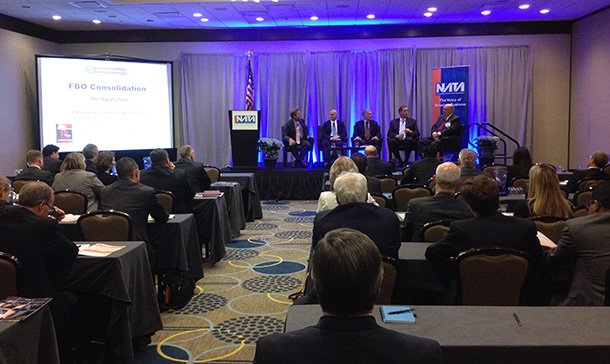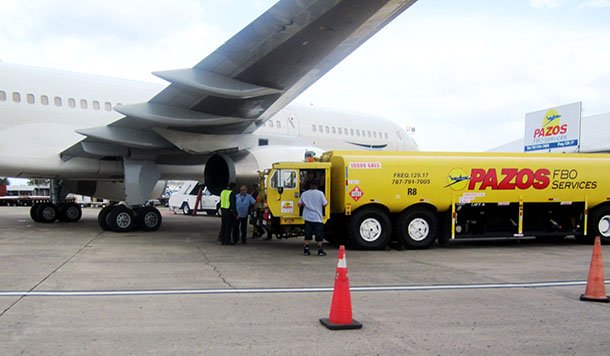
By John L. Enticknap and Ron R. Jackson, Aviation Business Strategies Group - ABSGgroup.com
- Authors of the forthcoming book: FBO Survival. 10 Tips to Keep Your Operations Lean, Mean & Profitable.
Welcome to our blog series on FBO Best Practices. With each blog post in this series, we’ll discuss “Best Practices” in running an efficient and effective FBO operation.
Best Practice #9: Charge for the free stuff. This is a simple reminder that every customer must contribute to your revenue stream, even the reluctant customer who doesn’t buy fuel.
The FBO business model that we’ve enjoyed for the past 50 plus years is dying a slow but inevitable death. If your FBO is still trying to exist on the margin charged on fuel sales, this is your wake up call.
In the “salad days” of our business, a healthy fuel gross margin of $2 per gallon or more would cover an FBO’s monthly expenses including the airport lease, insurance, facility upkeep and renovations, expansion, utilities, employee wages/compensation, fees and taxes, not to mention all the free stuff flight crews have come to expect.
But a $2 margin, normally factored into a posted price, is no longer realistic. No customer buys fuel at the posted price. It has been eroded over time by:
- Change in fuel buying habits by aircraft operators.
- Pre-negotiated fuel purchasing.
- Calling ahead for best discounts available.
- Changing plans to get the best overall fuel purchase cost.
- No fuel required by operators.
- - Purchase of more fuel efficient aircraft.
- Utilizing fuel tankering models.
- Pre-established fuel points.
- Better ATC routing for weather & flight planning to minimize costs.
- Fuel brokers negotiating lower fuel prices.
- Rising regulatory costs.
- Higher flowage fees charged by the airport.
- Increases in operating and insurance costs including liability, workman’s comp, health insurance, war risk, etc.
Note: An average sized FBO can have insurance costs as high as a $1,000 a day.
A Morphing Business Model
At the recent NBAA Conference held in Orlando, Florida on October 21-23, our company, Aviation Business Strategies Group (ABSG), was asked to facilitate one of our NATA FBO Success Seminar educational sessions titled: Get Ready for a New FBO Business Model.
 A standing-room only crowd of aircraft operators and FBOs packed the session and took part in a lively follow-on discussion on how FBOs need to change the way they charge for services in order to continue providing first class facilities and great customer service.
A standing-room only crowd of aircraft operators and FBOs packed the session and took part in a lively follow-on discussion on how FBOs need to change the way they charge for services in order to continue providing first class facilities and great customer service.
The premise we presented is simple. As in the European FBO business model where services are unbundled, every aircraft operator that taxis onto your ramp must contribute to your revenue stream whether or not they purchase fuel.
Many FBOs have taken initial steps in this direction by imposing a ramp fee and/or a facilities fee. In general, these fees are normally waived if operators purchase a qualifying load of fuel.
However, many ancillary services are still being given away regardless of the selling price of a gallon of fuel. Aircraft operators expect baggage to be loaded and unloaded by the FBO. They expect trash service and galley service with ice and coffee. They may even expect free GPU and lavatory services as well as free towing, parking, tie downs and aircraft placement for departure. They also expect concierge services including taxi, limo and rental car logistics.
Then there are the clean restrooms, free coffee, popcorn and snack bar. Many FBO facilities offer a variety of crew lounges, rest areas, quiet rooms, computers, printers, Wi-Fi, copy, fax, flight planning, crew cars, and the list goes on.
As mentioned, gone are the $2 gross fuel margin days and selling fuel at the posted price. With all the customer and fuel broker pressures to discount fuel, gross fuel margins can get as low as $1.25 to $1.40 per gallon with some FBOs dropping to less than a $1 per gallon discount on contract fueling.
What aircraft operators don’t realize is when margins get this low, something has to give. Facilities fall into disrepair, customer service declines, dissatisfaction and disputes follow. No one wins in this scenario.
The New FBO Business Model
Since no FBO wants to be the first to start charging for unbundled services, what we at ABSG propose is a three-tier system.
Tier One: Full Service Pricing
Pay the full service posted price and get all the services thrown in.
Tier Two: Basic Fuel Service with À La Carte Pricing
Pay a discount off posted or a contract fuel price. Then pay for all the ancillary services requested. If no ancillary services, then also pay a facilities fee.
Tier Three: No Fuel Purchase
Pay a ramp fee, facilities fee and à la carte pricing for ancillary services requested.
At our NATA FBO Success Seminar, we discuss these issues in depth as well as a comprehensive examination of FBO operations, marketing, training and best practices. The next NATA FBO Success Seminar is schedule for March 9-10, at the Sands Expo Center in Las Vegas.
Tell us what you think—we appreciate your comments and thoughts. Also Like us by clicking the link below.
Send us an email to Ron@thejacksongroup.biz or jenticknap@bellsouth.net and visit us online at www.ABSGgroup.com.
About the bloggers:
John Enticknap
John Enticknap has more than 35 years of aviation fueling and FBO services industry experience and has served as president/CEO of Mercury Air Centers, a network of FBOs he grew from four facilities to 21 locations. He has international FBO experience including opening the Royal Aviation Terminal in Kuwait. John has held executive management positions with DynAir Fueling and CSX Becket Aviation and holds a Bachelor of Science in industrial management from Northeastern University. He teaches the acclaimed FBO Success Seminar for the National Aviation Transportation Association (NATA) and is an NATA certified safety auditor. John is the co-author of the forthcoming book FBO Survival! Keeping Your Operation Lean, Mean & Profitable. He also writes an industry blog titled FBO Connection for Penton‘s AC-U-KWIK Alerts. He is an active ATP and CFI rated pilot with more than 8,100 flight hours; certified in both fixed and rotary wing aircraft. jenticknap@bellsouth.net, Ph: 404-867-5518 www.absggroup.com
Ron Jackson
Ron Jackson is co-founder of Aviation Business Strategies Group and president of The Jackson Group, a PR agency specializing in FBO marketing and customer service training. He has held management positions with Cessna Aircraft, Fairchild Aircraft and Bozell Advertising. Ron developed the strategic marketing communication plan and programs for Mercury Air Centers and consults with numerous FBOs in areas of marketing, promotions and customer service training. He is the author of Don’t Forget the Cheese! The Ultimate FBO Customer Service Experience. and co-author of the forthcoming book FBO Survival! Keeping Your Operation Lean, Mean & Profitable. He is a certified journalist and co-developed NATA’s acclaimed FBO Success Seminar Series. Ron writes an industry blog for Penton’s AC-U-KWIK Alerts titled: The FBO Connection. Ron@thejacksongroup.biz Ph: 972-979-6566 www.absggroup.com
There is nothing more difficult to take in hand, more perilous to conduct, or more uncertain in its success, than to take the lead in the introduction of a new order of things
















